- BY Colin Yeo

Reader survey results 2020
THANKS FOR READING
Older content is locked

A great deal of time and effort goes into producing the information on Free Movement, become a member of Free Movement to get unlimited access to all articles, and much, much more
TAKE FREE MOVEMENT FURTHER
By becoming a member of Free Movement, you not only support the hard-work that goes into maintaining the website, but get access to premium features;
- Single login for personal use
- FREE downloads of Free Movement ebooks
- Access to all Free Movement blog content
- Access to all our online training materials
- Access to our busy forums
- Downloadable CPD certificates
Table of Contents
ToggleOver 1,100 people took the Free Movement reader survey this year. I’d like to thank everyone who did so. The positive feedback was enormously encouraging — I read every comment — and the less positive feedback was the whole point of the exercise, so if anything even more valuable.
This post gives a flavour of what you all think about Free Movement and what I intend to do with the results. It doesn’t replicate our internal review of the results in its entirety because that would be an enormous blog post, so if you submitted a comment that isn’t mentioned here, rest assured that it was considered just the same.
Overview
I was very pleased to see that our average rating on a nominal scale of 1 to 5 was again 4.6, the same as our last survey in 2018.
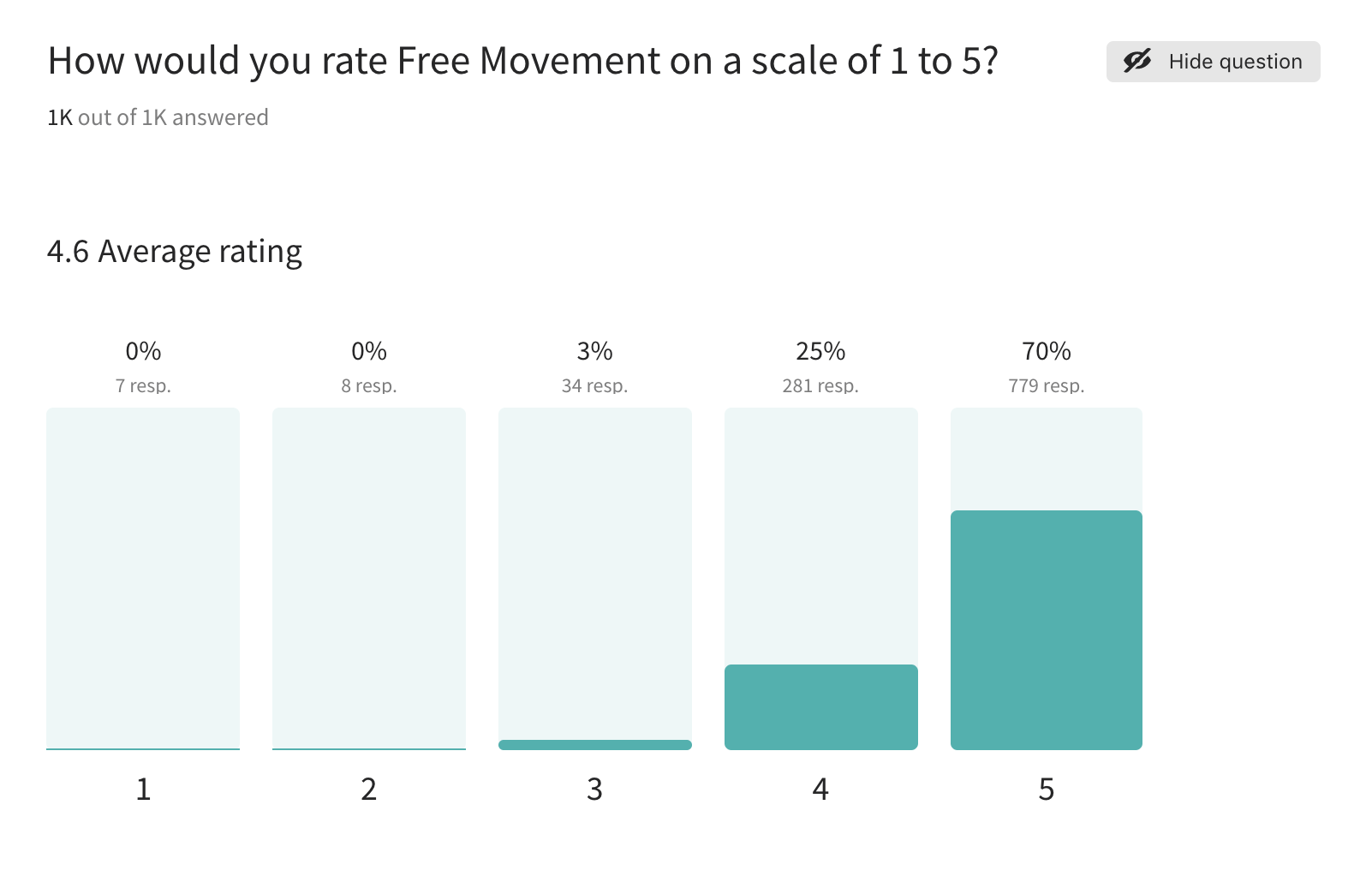
Almost everyone thought that the quality of output is either getting better or staying the same.
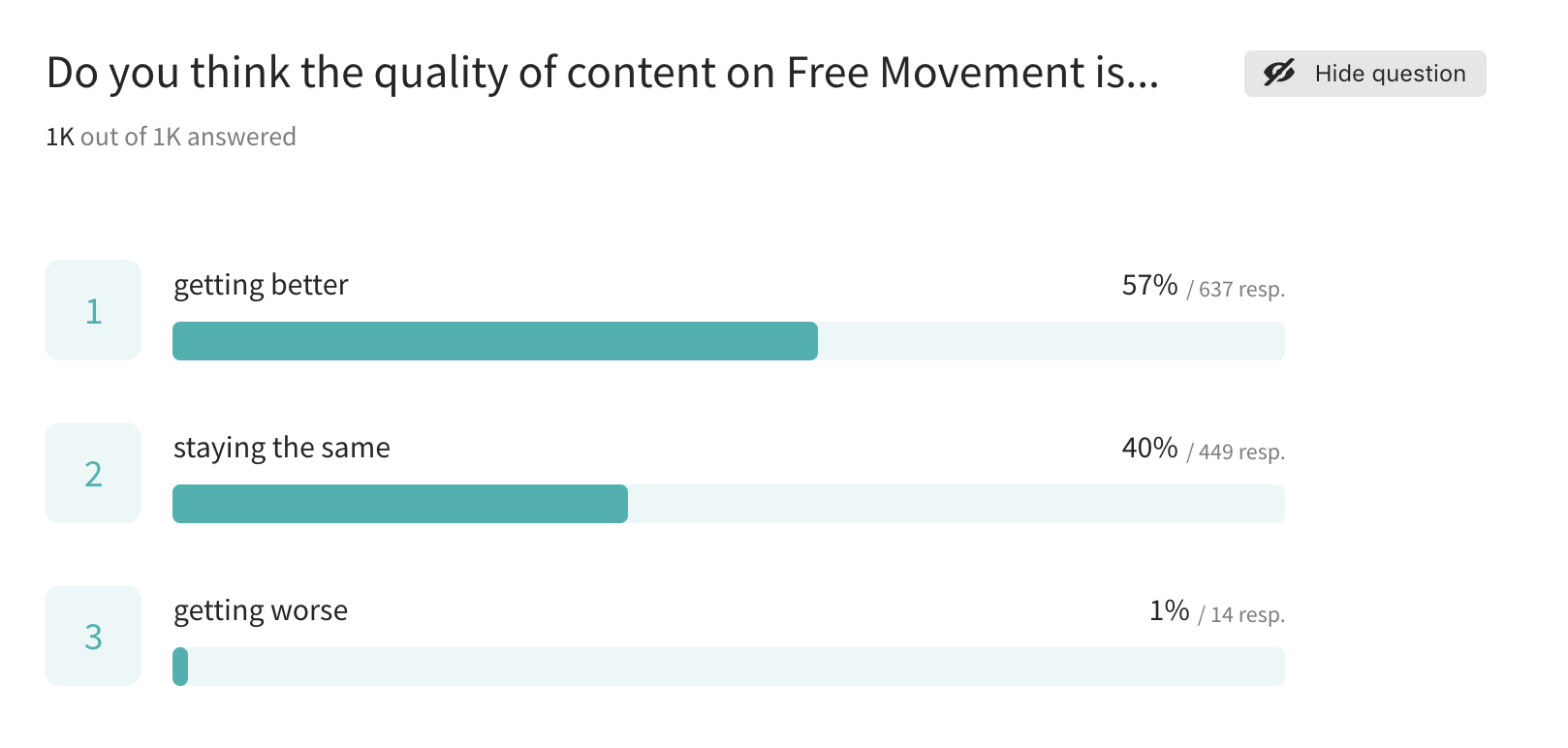
The survey also forced everyone to nominate just one topic within immigration and asylum law as their “main area of interest” and then asked how well that one main area of interest was covered. We are doing best on coverage of asylum and EU law, and overall over half of readers felt that there was adequate coverage of their pet subject. Others, naturally enough, wanted more.
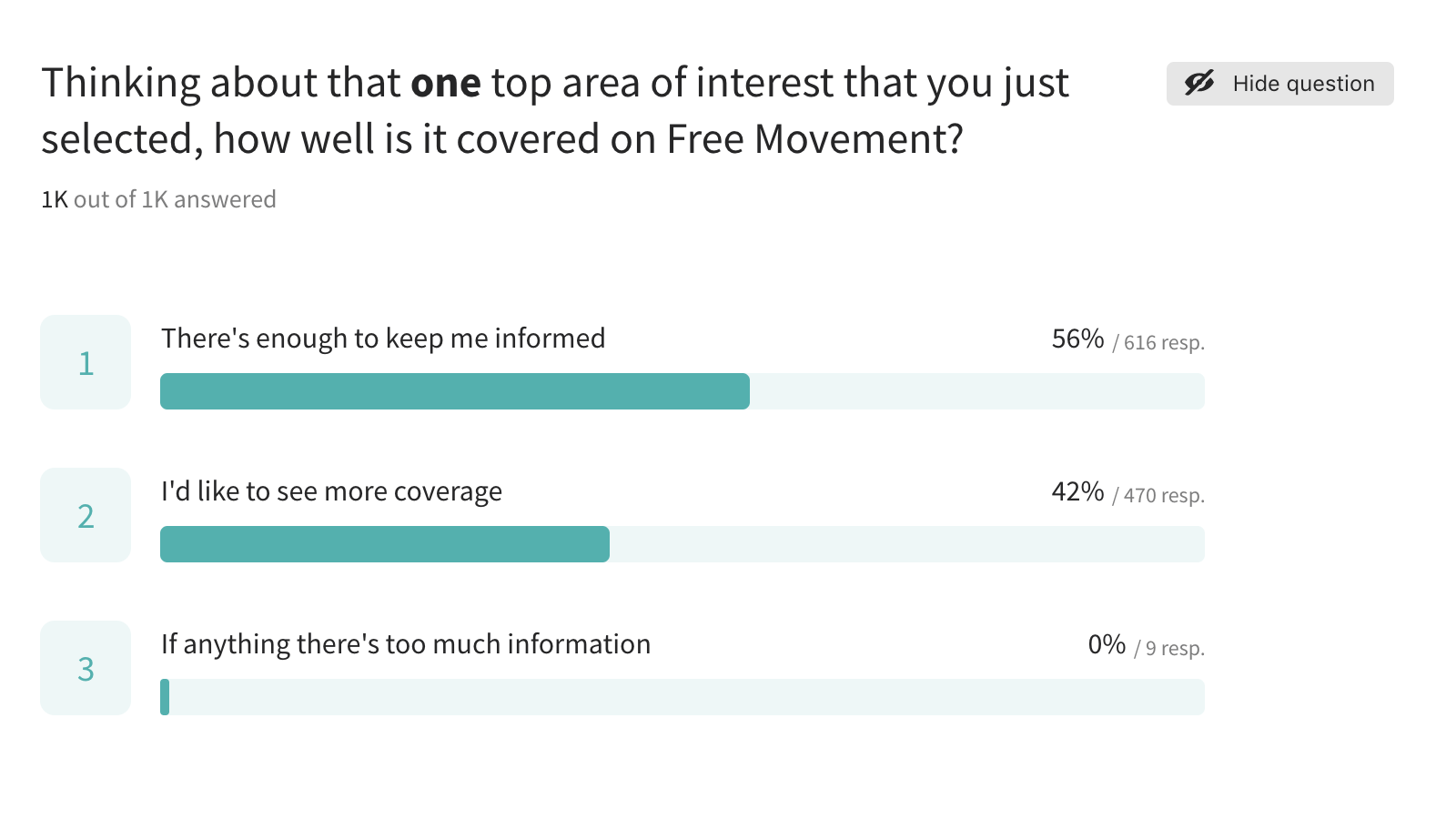
I’ll now go into areas of possible change and improvement — some that I floated in the survey, and some that came back via reader comments.
Quality
As I said, a solid majority of readers gave us a five star rating. However there were some flies in the ointment, such as these comments:
There are so many typos in the OISC Level 1 immigration course.
Please consider hiring a copy-editor to ensure all of your training material and posts are error-free.
What I am doing about this: commissioning a copy editor to fix typos in the OISC Level 1 course. There is a massive amount of material in that course and I am not necessarily surprised that it is a bit messy, but it certainly needs to be fixed. Budget permitting, I will let him loose on the other training materials as well. Day-to-day posts are a bit tricker and probably one for CJ, the deputy editor, to keep an eye on.
Updates are too late. FM is always the last to comment. It hasn’t kept up with speed of social media.
Most of the content that is published is published too late, and is freely available through other sources – far too many occurrences of oh, Free Movement has finally caught up. Unfortunate, as it was once a conversation starter.
What I am doing about this: Speed is certainly a priority so this is disappointing to hear. We try to balance speed with accuracy and actually having something useful or interesting to say. Additionally, for our contributors to have something useful to say, it is important they are practising lawyers… who by definition have clients to meet and urgent work at any given time. We’ve taken that on board, though, and will try harder on the speed front!
Cost of membership
A few comments along these lines:
Links to your case comments only work for a certain period. After that, they go behind a paywall, or at least a registration wall. Would you consider changing that?
It’s obvious you are becoming more commercial and profit based then necessary… your membership is quite expensive. Have on your mind that free legal advice is also available on the internet.
What I am doing about this: It costs money to run this website. Aside from my own time, there’s CJ and Faye’s salaries, the payments to contributors and the running costs of the hosting and software. We are entirely independent and self-funded and do not receive grants or similar. We try to strike a balance between making our information available for free or a low one-off cost for occasional users and encouraging professional users to pony up. The main way we do that is through the paywall.
I’m afraid the case comments are the most obvious candidates to keep paywalled (although they are still available free for 30 days) because we do keep a large number of more general interest articles free to access, subject to an overall limit of 15 a month. Paid membership is the business model that keeps us going in our current form and we do not want to try and shift to an alternative advertising model; nor do we think that would cover our costs.
In terms of the cost, the price of an annual Free Movement membership is unchanged since I introduced it five years ago (£200 + VAT) and I have no immediate plans to increase it. We can also cater for different situations, such as this one:
It would be nicer to pay monthly for membership than pay annual payment which is quite a lot at the moment.
You can pay monthly — select that option on the Join page for details. This is to try to cater for people who want, for example, to do a quick burst of research on their case without necessarily staying with us for the long haul.
I work for a charity and it would be of great assistance to us if we could have Free Movement annual membership at a discounted rate, if possible.
It certainly is possible: membership for charities is half price. To guard against abuse, I do need those seeking to take this up to send an email requesting it to editor@freemovement.org.uk, before trying to purchase membership through the Join page.
For students there should be no VAT and fee should 1/4.
As above: email editor@freemovement.org.uk to enquire about a 50% discount for students.
In the meantime, we have spent some time tidying up the resources on our Hub Pages. That may be a good way of discovering articles and analysis about a particular subject that you may have overlooked in the past; ditto our archive function where you can filter by subject.
What we cover and how
In terms of what we cover, there were a couple of survey questions that give us a sense of what people are interested in. First there is the straight question about what readers’ interests are, with multiple selections allowed. The topics most commonly selected were nationality and citizenship (63%), family immigration (59%), human rights (58%) and EU law and rights (57%). All subjects had at least of quarters of readers interested.
But of course we have to prioritise, and so included the question forcing people to choose just one top subject of interest. We then asked how we were doing in terms of covering that subject. The results show that, discounting some areas that very few people selected as their one main interest, the most in-demand subjects are nationality, family, business and students and human rights.
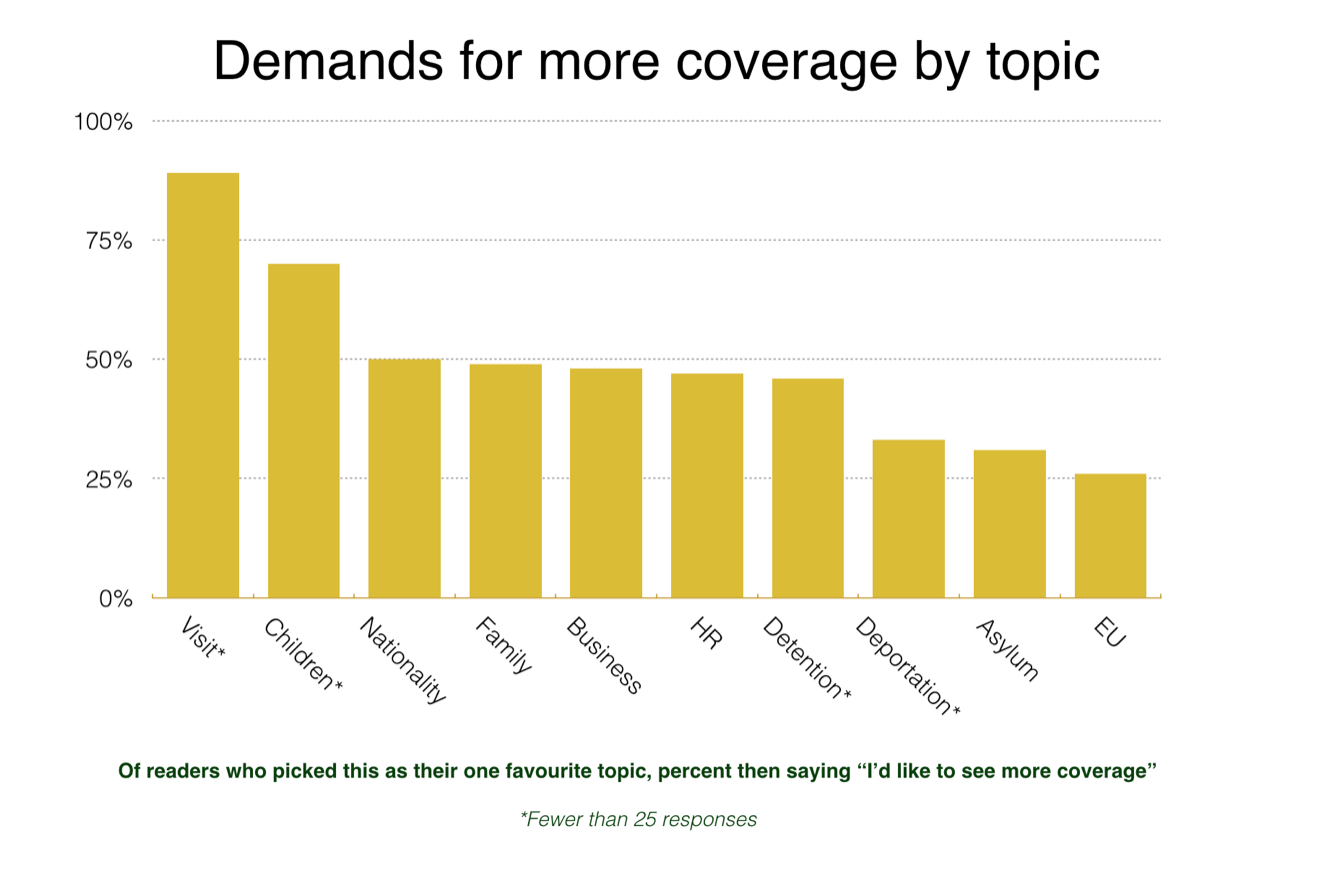
We also serve up our coverage in different formats. Articles can be newsy, deep dive “briefings”, case law focused, “comment” type advocacy, etc. When asked which of the different formats people wanted more of, the winner was “how to” practical tips and suggestions. Significantly, this was the case for both professional and non-professional readers, who otherwise split on the level of details they want from Free Movement.
What I am doing about this: I feel we cover the most popular topics fairly well already but we can always improve. It was interesting to see nationality information in such demand. In response, we recently put out a new blog post on naturalisation and we can also look at putting together some similar posts on registration routes. Overall, we will aiming to produce more “how to” articles focusing on the practicalities of making an application, in particular for family visas and citizenship applications. While these will not be news to experienced readers, there’s a lot of people out there who do not answer to that description.
Podcasts and videos
As (checks notes) 39% of you are aware, we have a podcast. This is me and CJ doing a monthly round-up, and less frequent interviews with practitioners on certain topics. We worry about the technical quality sometimes but when we asked for listeners’ suggestions for improvement, this didn’t seem to be a big concern. The main request was to make the podcast more regular (44% selecting).
What I am doing about this: from now on we are going to put out the monthly update podcast on the second Friday of every month (starting tomorrow) and alternate it with an interview-focused episode on the fourth Friday of every month.
The ideal, obviously, is simply once a week on a Friday (or whenever) but that is probably more than we can manage at present. Two a month would be an improvement on what we have managed over the past couple of years so we’ll start with that and see where we get to by the end of 2020.
There was also this sensible point about the monthly update:
it would be good to have the time codes of each part [of the monthly update podcast] so we can skip to the parts of interest.
What I am doing about this: putting them in, starting with the last episode.
Videos: are very much ad hoc and likely to stay that way. We have a few of me talking to camera and a few 60-second voiceovers giving a very basic intro. There were a few comments on these:
The videos in the OISC Level 1 immigration course are just too short. Does not need to be 60 seconds!
[Videos should be] longer, [in] more depth.
Colin talking at a screen is out-dated. Consider making 2-4 minute informational videos in the ’60-second’ clip style.
We also have a couple of screencasts of the EU Settlement Scheme process which have 130,000 views between them and lots of positive comments:
Loved the video on the EU Settlement process talking through the app – it took a lot of anxiety away and I shared it with a lot of other organisations and people.
What I am doing about this: I agree that me talking at a screen is outdated and understand that a 60 second video isn’t enough for professionals (they were created for YouTube and popped into training courses as a bonus) so will explore the suggestion of making longer ones in the same format, ie voice over images/text rather than just me talking to camera. In line with the commitment above to produce more “how to” content, we’ll also try to replicate the success of the EU Settlement Scheme screencast with some other application types (bearing in mind that all this is very labour intensive).
Finding your way around
Free Movement has now been around for 13 years and there is a lot of material in our archive. We do have a search function, but…
One thing that could be improved is the search function for blog posts
The searches for relevant information are a bit random
What I am doing about this: talking to the developers to see what we can do, if anything. I have myself taken to using Google search to find relevant articles, to be frank: putting the keywords you’re looking for information about into Google alongside the phrase “freemovement” can often be more effective than our own internal search.
We also reckoned that the members’ forum, while popular, could potentially be made more accessible by changing the format within the limits that the website software allows. The members polled on the options voted as follows:
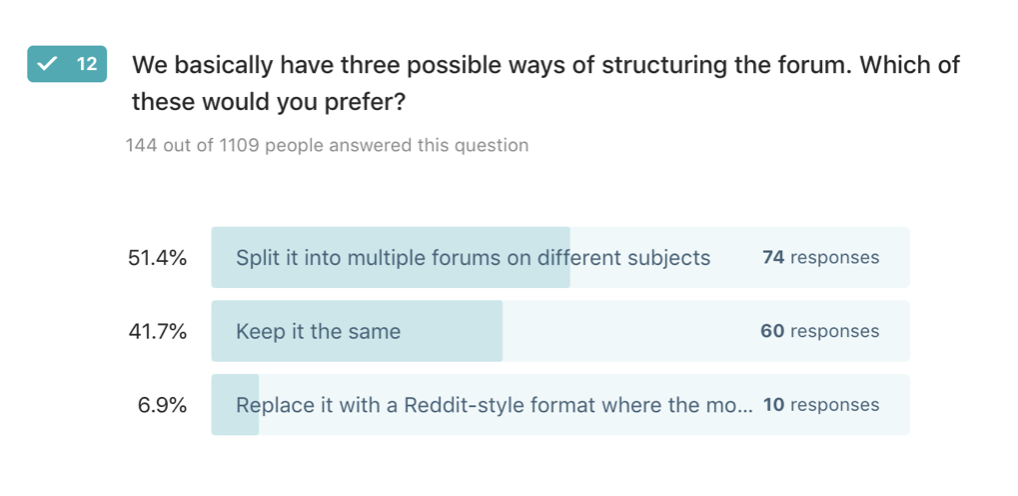
What I am doing about this: keeping the status quo, given that there is only a narrow minority in favour of change, which is inherently risky. We used to have multiple forums but selecting the right forum meant an extra and not always predictable step in selecting the right one.
Some readers are only interested in articles on a particular subject, EU law being a popular one because of Brexit:
Sometimes it’s difficult for me to scroll through all the information, as I’m only focusing on EU nationals rights. Perhaps add a filter so I’ll receive info only on this matter ?
You can visit our subject-specific Hub Pages or filter our Archive by subject area (this may be a little less obvious on mobile than on desktop). For the person who requested a “case law archive”, case law exists both as a Hub and as a filter in the archive.
If you get your Free Movement materials by email, you also can set your preferences to receive only updates on:
- Asylum
- Deportation and detention
- Business
- OISC
- Brexit
The Brexit newsletter is increasingly infrequent because Brexit has now happened, so we have now updated this to a new “EU rights newsletter” to alert people to articles about EU citizens’ rights more generally.
There were also a few questions about getting legal advice through Free Movement:
Is there any way of getting quick answers to questions?
I am an EU citizen (French) living in UK with UK citizen husband and I would like to apply for UK citizenship in 2021 with some help. is it possible to be helped by your organisation?
In both cases, the answer is yes, as a paid service: see here. It is easy to book short video link advice sessions via Free Movement, a cost-effective application checking service or full legal representation, all of which are provided by Seraphus Solicitors.
Tone
There were, as in the 2018 results, several comments about our signature, world-weary “What have the bastards at the Home Office done now?” style of commentary:
less intemperate language and obvious bias in personal criticisms.
The main drawback for me – which i put up with for the content – is the incessant snide, arrogant and condescending style, tone and manner in which many articles are written… having everything written from the perspective of how awfully stratospherically clever immigration lawyers are and how totally uniformly stupid the Home Office are is very wearing for those looking for a more nuanced analysis and I find quite alienating.
What I am doing about this: well, not necessarily anything in the short term, since the opinionated style seems to serve many readers well:
Totally disagree with the comment that Home Office criticism is off-putting!
That said, snark is certainly not mandatory for our varied pool of contributors; frustration with departmental decision-making and policy bubbles up naturally anyway. That’s often what happens when you deal with the Home Office day in, day out.
That said, in the interests of balance, I am always open to articles (anonymous or otherwise) giving the Home Office point of view. Please get in touch if you are interested.
Some other comments on tone focused on levity rather than hostility:
Just to clarify I’m not against humour and light relief which is an important part of surviving as an immigration lawyer. However, sometimes I’ve felt some of the humorous pieces come across as a little insensitive and/or more focused on the difficulties of the lawyer than what our clients are experiencing.
What I am doing about this: acknowledging it and bearing it in mind. Hopefully it is obvious that any lapse in taste resulting from humour is not in the least mean-spirited.
Humour is nice in a normal article but in general 100% humorous articles a bit cheesy. However, there is always a place for good satire and unusual commentary like the classic Paddington piece. IMO the difference is the good ones retain an educational element, weaving the law in rather than just repeating jokes about the HO which should stay on Twitter.
What I am doing about this: This seems like a good way of approaching satire-type articles in future.
Specific requests
Finally, a few specific questions from the comments:
please put down DW [domestic worker] visa as a category
What I am doing about this: I can’t guarantee ongoing coverage but will definitely put a briefing together.
I would like to see more about Ancestry visas… I would also like to see some analysis on the affects that the new harsher rules are having on things like the Youth Mobility visa.
What I am doing about this: commissioning some analysis on both these categories.
It would be useful to see more BME contributors and maybe some case studies of particularly relevant issues – interviews or conversations with clients perhaps.
What I am doing about this: I welcome pitches for articles about race and immigration from migrants, lawyers, civil servants, judges, academics or others connected to the immigration system in some way, particularly those from a BAME background. We will bear in mind diversity among interviewees also, although giving a voice to clients is not necessarily our forte and there is powerful work to that effect going on in the NGO sector.
As an Independent Social Worker completing reports in relation to immigration matters, it would be helpful to have feedback from the tribunal service /judges as to what elements they find beneficial in ISW reports.
What I am doing about this: Interesting – I’ll see what I can do.
Perhaps it would be useful to think about having a closer co-operation with the UK non-legal refugee/asylum/human rights sector in the future.
What I am doing about this: it’s a fair point — we would like to be a bit more engaged, time permitting. If your organisation has a press distribution list or a newsletter, feel free to add CJ to it. We’re also looking to commission some pieces from new contributors to vary our content a bit, so get in touch if you are interested.
I think the only thing I’d like is the ability to download and print off some of the articles (I prefer reading long things on paper). At the moment, I have to copy them into a Word document and then print.
What I am doing about this: I’ll see if there is a plugin that can convert articles into pretty printable documents. In the meantime, have you tried pressing “file” then “print” in your browser menu?
The forum isn’t greatly optimised for android phones. It can be quite difficult to navigate, and quite often menu functions are imposed over one another.
What I am doing about this: we depend on software called BBPress for the forum, which is somewhat sub-optimal, but it would be a huge job to try and import all the existing forum content into new software. We’ll need to commission a website software overhaul at some point in the nearish future and will look at it as part of that exercise. It is a big and very expensive job, though, which is quite the disincentive at our end unfortunately!
Finally, thank you again for everyone who responded. Writing for a website is a strangely asymmetric experience and it is very encouraging that so many people find what we do useful.
SHARE

